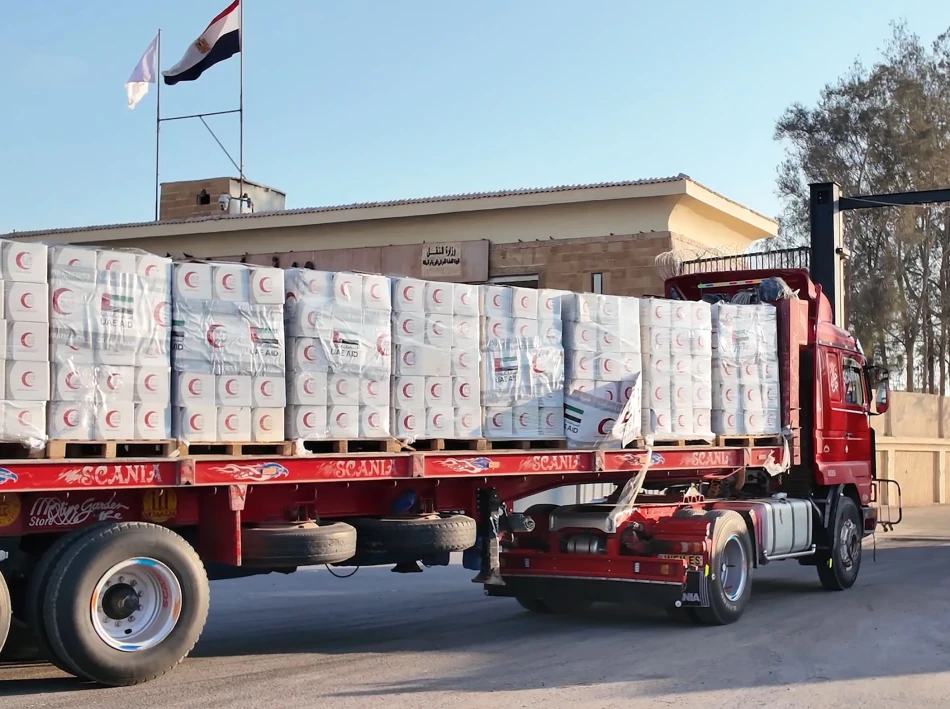
UAE Delivers 128 Truckloads of Humanitarian Aid to Gaza through Rafah Crossing
UAE Delivers 2,000 Tons of Aid to Gaza in Two-Week Humanitarian Push
The United Arab Emirates has significantly escalated its humanitarian response to Gaza's crisis, delivering over 2,000 tons of essential supplies through eight aid convoys in just two weeks. This surge in assistance, part of the UAE's "Noble Knight 3" operation, brings the total aid delivered through Egypt's Rafah crossing to more than 12,000 tons since border reopening in late July.
Strategic Coordination Through Egyptian Territory
The 128 trucks that crossed into Gaza carried food supplies and shelter materials, demonstrating the UAE's methodical approach to crisis response. UAE humanitarian teams stationed in Egypt's Al-Arish city oversee the precise loading and tracking of supplies, ensuring aid reaches intended recipients in Gaza.
This operational setup highlights the critical role of Egypt's Rafah crossing as the primary humanitarian corridor into Gaza, with the UAE leveraging established diplomatic relationships to maintain steady supply lines during a period of restricted access.
Escalating Humanitarian Diplomacy
The UAE's intensified aid efforts since July 27 reflect a broader strategy of humanitarian diplomacy that has become a hallmark of Emirati foreign policy. Unlike direct military intervention or political mediation, this approach allows the UAE to demonstrate regional leadership while maintaining relationships across the political spectrum.
Regional Context and Precedent
The UAE's response follows patterns established during previous regional crises, including humanitarian interventions in Yemen, Syria, and Lebanon. This consistent approach has positioned the Emirates as a reliable humanitarian actor, potentially strengthening its influence in future diplomatic negotiations.
The scale and speed of the UAE's Gaza response also contrasts with more cautious approaches from other regional powers, suggesting the Emirates sees humanitarian leadership as strategically valuable during this particular crisis.
Implications for Regional Dynamics
The UAE's prominent humanitarian role carries several strategic implications. For regional observers, it demonstrates the Emirates' capacity to mobilize resources quickly and operate effectively through third-party territories. This logistical capability has broader implications for the UAE's regional influence and crisis response capabilities.
The emphasis on supporting "vulnerable groups" and providing "basic necessities" also aligns with international humanitarian standards, potentially strengthening the UAE's standing with global partners while addressing immediate human needs in Gaza.
Sustained Commitment Strategy
The UAE's public commitment to continued support suggests this humanitarian campaign extends beyond immediate crisis response. Such sustained engagement often serves dual purposes: addressing genuine humanitarian needs while establishing long-term influence and goodwill that can prove valuable in future diplomatic initiatives.
The systematic nature of the aid delivery—with dedicated teams, precise tracking, and regular convoy schedules—indicates institutional commitment rather than ad-hoc assistance, suggesting the UAE views this as a long-term strategic investment in regional stability and its own diplomatic positioning.
Most Viewed News

 Sara Khaled
Sara Khaled






